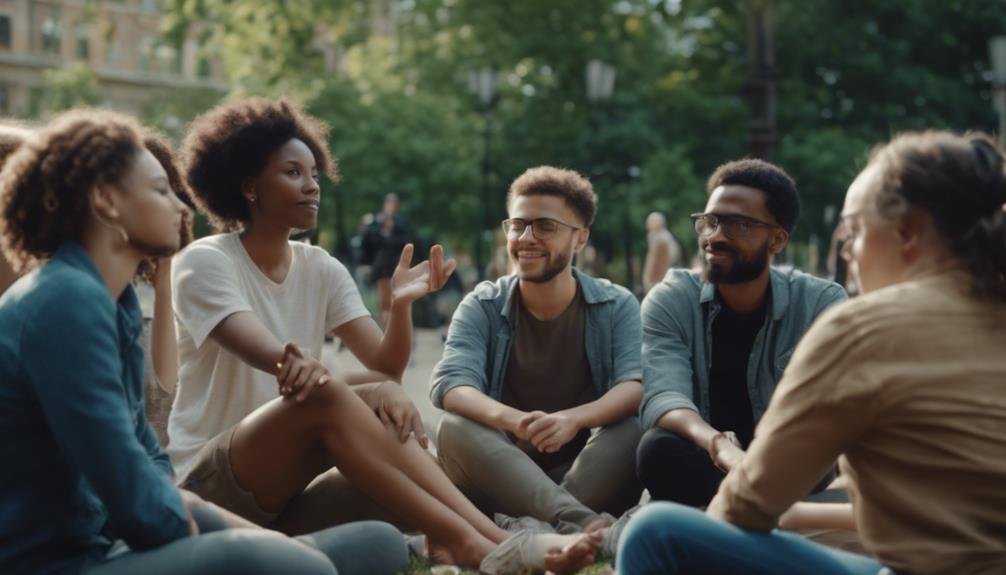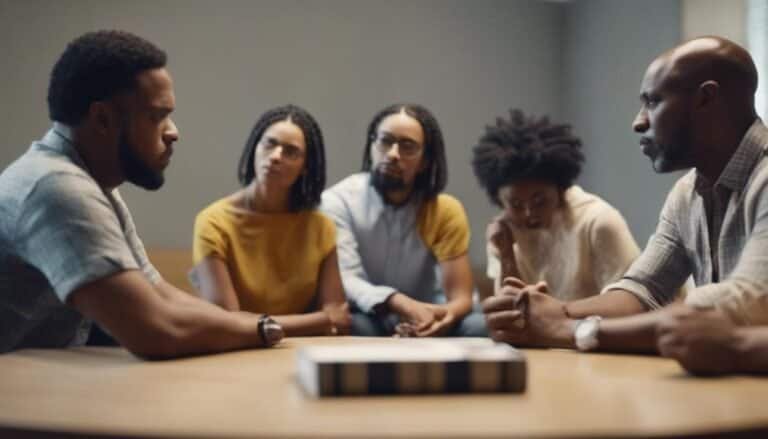Group Therapy Dynamics and Benefits
Imagine group therapy as a symphony orchestra, where each instrument plays a vital role in creating a harmonious melody. The dynamics within a therapy group are like the different sections of an orchestra, coming together to produce a beautiful piece of music.
As you explore the intricacies of group therapy dynamics and the benefits they offer, you will uncover a world where shared experiences, mutual support, and personal growth intertwine in ways that can truly transform your journey towards healing and self-discovery.
Key Takeaways
- Participants interact for healing and share experiences.
- Vulnerability fosters trust and authentic connections.
- Open communication deepens understanding and connection.
- Sharing insights and experiences builds empathy and coping strategies.
Understanding Group Therapy Dynamics
In group therapy, participants interact and share experiences to support each other's healing process. Group dynamics play an important role in shaping the atmosphere and effectiveness of the sessions. Understanding group dynamics involves recognizing how individuals' behaviors, attitudes, and relationships influence the overall group dynamic.
Conflict resolution is a key aspect of managing group dynamics. When conflicts arise, addressing them openly and constructively can strengthen group cohesion and trust. Group therapy aims to foster a safe space where members feel comfortable expressing themselves and exploring their emotions.
This process can be influenced by various factors, including the personalities of the participants, the leadership within the group, and the overall group dynamic. By navigating group dynamics effectively, participants can enhance their therapeutic experience and support each other's growth. Developing a deeper understanding of group dynamics can lead to more meaningful interactions, increased empathy, and a stronger sense of community within the therapy group.
Building Trust and Rapport
To foster trust in group therapy, you must embrace vulnerability and openness. Engaging in relationship-building exercises can help strengthen connections with others.
Trust Through Vulnerability
Establishing trust and rapport in group therapy sessions can be facilitated through embracing vulnerability as a means of fostering authentic connections among participants. When you allow yourself to be vulnerable, it opens the door to genuine interactions and mutual understanding.
Here are some ways vulnerability can help build trust and rapport:
- Sharing personal struggles can create a sense of solidarity among group members.
- Being open about your emotions encourages others to do the same, promoting authenticity.
- Vulnerability leads to deeper conversations and a better understanding of each other's experiences.
- Expressing vulnerability can help in building resilience by facing and processing difficult emotions together.
Relationship Building Exercises
Embracing relationship building exercises can further enhance trust and rapport within group therapy sessions. Trust exercises and team-building activities serve as powerful tools to strengthen connections among group members.
Icebreakers and bonding activities help break down barriers, fostering a sense of unity and understanding within the group. By engaging in these exercises, individuals can develop a deeper level of trust and establish meaningful relationships with their peers.
Through collaborative tasks and communication exercises, group members can build mutual respect and empathy, creating a supportive environment for sharing and growth. These relationship-building activities not only enhance the overall group dynamic but also encourage individual members to feel more connected and supported throughout the therapy process.
Encouraging Open Communication
Creating a supportive environment is key to fostering open communication in group therapy sessions. When participants feel safe and supported, they're more likely to express their thoughts and feelings openly. To encourage such an atmosphere, consider the following:
- Practice active listening: By truly listening to others without judgment, you show respect and build trust within the group.
- Offer emotional validation: Acknowledging and validating the emotions of others helps create a sense of understanding and connection.
- Resolve conflicts constructively: Addressing conflicts openly and respectfully can lead to a deeper understanding of each other's perspectives.
- Encourage honesty and transparency: Promoting honesty and transparency in communication can help group members feel comfortable sharing their true selves.
Sharing Experiences and Insights
Encouraging group members to actively share their experiences and insights can deepen connections and enhance the therapeutic process. By opening up and discussing personal insights and shared experiences, individuals in group therapy can create a supportive environment where emotional reflections are met with understanding and empathy from peers. This sharing not only allows for a deeper level of trust to develop within the group but also provides an opportunity for members to gain new perspectives and coping strategies from others who may have faced similar challenges.
—
| Benefits of Sharing Experiences and Insights | ||
|---|---|---|
| 1. Enhanced Connection | 2. Increased Empathy | 3. New Perspectives |
| Sharing fosters deeper bonds among group members | Allows for better understanding of others' struggles | Provides alternative viewpoints and coping mechanisms |
Promoting Empathy and Understanding
To foster a deeper sense of connection and mutual understanding within a group therapy setting, it's essential to actively engage in exercises that promote empathy and encourage listening with an open mind. Empathy exercises and understanding activities play a critical role in building trust and emotional bonds among group members. Here are a few key activities to help promote empathy and understanding:
- Reflective Listening: Practice active listening without judgment, reflecting back what the speaker has said to show understanding and validation.
- Role Reversal: Encourage group members to switch roles with one another to gain a new perspective and better understand each other's experiences.
- Empathy Mapping: Create visual representations of individual experiences to foster empathy and compassion within the group.
- Personal Storytelling: Allow each member to share personal stories, promoting compassion building and perspective sharing among the group.
Enhancing Social Skills
You can start enhancing your social skills by focusing on improving your communication abilities.
Building empathy and understanding is another important aspect that can greatly benefit your interactions within the group therapy setting.
Communication Skills Improvement
Enhancing social skills through communication improvements is essential for successful group therapy dynamics. Improving listening skills allows you to truly understand others' perspectives. Assertiveness training helps you express your thoughts and feelings confidently. Effective communication fosters a supportive environment where everyone feels heard and valued. It encourages healthy interactions and builds trust among group members.
- Active Listening: Engage fully with others when they speak.
- Open Communication: Encourage honesty and transparency in discussions.
- Respectful Feedback: Provide constructive criticism with kindness.
- Nonverbal Cues Awareness: Pay attention to body language and facial expressions for deeper understanding.
Building Empathy and Understanding
Building empathy and understanding in group therapy settings is essential for fostering a supportive and inclusive environment where members feel valued and heard. Engaging in empathy exercises can help you develop a deeper connection with others in the group. By actively listening and trying to understand perspectives different from your own, you can enhance your social skills and build stronger relationships.
Practicing empathy allows you to acknowledge and validate the feelings of your peers, creating a safe space for open communication and mutual respect. Through understanding perspectives, you not only broaden your own worldview but also contribute to a more empathetic and compassionate group dynamic. Embracing empathy and understanding in group therapy can lead to personal growth and a sense of belonging within the group.
Providing Emotional Support
During group therapy sessions, offering genuine emotional support can greatly impact the overall dynamic and outcomes for all participants involved. Providing a safe space for individuals to express their feelings and receive validation from their peers fosters a sense of belonging and encourages personal growth.
Here are some key ways to provide effective emotional support:
- Active Listening: Engage fully with the speaker, showing empathy through attentive listening and nonverbal cues.
- Encouraging Words: Offer words of encouragement and affirmation to uplift and motivate others.
- Empathetic Responses: Respond with sensitivity and understanding, acknowledging the emotions expressed by group members.
- Validation: Validate the feelings and experiences shared by validating their emotions and showing understanding.
Fostering a Sense of Community
To cultivate a strong sense of community within a group therapy setting, fostering authentic connections among participants is essential. Community building is at the core of group therapy dynamics, promoting group cohesion and a supportive environment. By establishing a sense of community, participants feel understood, valued, and connected, enhancing the therapeutic experience.
In fostering a sense of community, several strategies can be employed to strengthen the bond among group members. The table below outlines some effective methods for building community and enhancing group cohesion:
| Community Building Strategies | Benefits |
|---|---|
| Encouraging open communication | Fosters trust and understanding among participants |
| Organizing group activities outside of therapy sessions | Promotes social interaction and strengthens relationships |
| Establishing group norms and boundaries | Creates a safe and respectful environment for sharing |
| Encouraging peer support and validation | Enhances feelings of belonging and acceptance within the group |
Cultivating Self-Awareness
In order to deepen the therapeutic experience and promote personal growth, fostering self-awareness among group members is key. Cultivating self-awareness involves engaging in self-reflection exercises and mindfulness practices that can help individuals better understand their thoughts, emotions, and behaviors.
Here are some ways to enhance self-awareness within a group therapy setting:
- Guided Meditation: Encouraging group members to participate in guided mindfulness meditation sessions can help them become more attuned to their inner experiences.
- Journaling Prompts: Providing prompts for group members to journal about their feelings, triggers, and reactions can facilitate deeper self-reflection.
- Body Scan Exercises: Practicing body scan exercises can help individuals become more aware of physical sensations and the connection between their bodies and emotions.
- Feedback Loops: Creating a safe space for group members to give and receive constructive feedback can promote self-awareness by offering different perspectives on one's behavior and interactions.
Facilitating Personal Growth
You can enhance your self-awareness skills by actively participating in group therapy sessions. By encouraging emotional expression in a safe and supportive environment, you can foster personal growth and self-discovery.
Building interpersonal connections with others in the group can also contribute greatly to your journey of personal development.
Enhancing Self-Awareness Skills
Developing a deeper understanding of oneself is essential for fostering personal growth within group therapy dynamics. Engaging in self-reflection activities and mindfulness exercises can help you enhance your self-awareness skills. By delving into your thoughts and emotions, you can uncover underlying beliefs and behaviors that may be hindering your personal development. Here are a few ways to boost your self-awareness in group therapy:
- Journaling your thoughts and feelings daily
- Practicing mindfulness meditation to stay present
- Reflecting on past experiences to identify patterns
- Seeking feedback from others to gain different perspectives
These activities can aid in your journey towards greater self-awareness and personal growth.
Encouraging Emotional Expression
Encouraging emotional expression in group therapy sessions can greatly facilitate personal growth among participants. By embracing vulnerability and promoting healing, individuals can explore their innermost feelings and experiences in a safe and supportive environment.
Cultivating emotional expression not only allows for the release of pent-up emotions but also opens the door to deeper self-understanding and acceptance. Through sharing their emotions with others, group members can forge genuine connections and feel a sense of belonging.
This process of emotional expression fosters connection and creates a space for empathy and mutual support within the group. As individuals express themselves authentically, they not only work towards healing past wounds but also develop essential skills for building healthier relationships both within and outside the group setting.
Fostering Interpersonal Connections
Building strong interpersonal connections in group therapy sessions is essential for facilitating personal growth among participants. Through interpersonal bonding and emotional connections, individuals can feel supported and understood in their journey towards healing.
In a supportive environment, shared experiences create a sense of unity and empathy among group members. This connection allows individuals to feel less alone in their struggles and more encouraged to open up and explore their emotions.
As participants share their stories and vulnerabilities, a bond forms, fostering trust and mutual respect. These meaningful relationships not only provide comfort but also serve as a catalyst for personal growth and self-discovery.
- Shared Vulnerabilities: Fostering empathy and understanding.
- Mutual Support: Providing encouragement and strength.
- Emotional Validation: Acknowledging feelings and experiences.
- Sense of Belonging: Creating a community of acceptance.
Celebrating Achievements and Progress
Recognize and acknowledge the milestones achieved by individuals in group therapy sessions to foster a sense of accomplishment and motivation within the group. Celebrating milestones is vital for boosting morale and reinforcing positive behaviors. By highlighting individual achievements, you not only show recognition but also inspire others to work towards their goals. Consider organizing a progress party within the group to collectively celebrate everyone's successes. This can create a sense of unity and camaraderie, emphasizing that group success is just as important as individual accomplishments.
During these progress parties, take the time to reflect on the journey each member has taken and the obstacles they've overcome. By sharing these stories, you can inspire hope and resilience in others who may be facing similar challenges. Encouraging open communication and genuine celebration of achievements can strengthen the bond within the group and encourage continued progress. Remember, celebrating achievements isn't just about the end result but also about recognizing the effort and determination that led to success.
Frequently Asked Questions
Can Group Therapy Be Effective for Individuals With Severe Mental Health Issues or Disorders?
Group therapy can be very effective for individuals with severe mental health issues or disorders. It offers a supportive environment where you can develop coping mechanisms and benefit from treatment effectiveness through shared experiences and group dynamics.
How Can Group Therapy Dynamics Change When a Member Is Resistant to Participating or Engaging With the Group?
When someone resists participating in group therapy, it can disrupt group cohesion and hinder progress. Encouraging them gently, addressing their concerns, and showing empathy can help them feel supported and more willing to engage with the group.
Are There Specific Techniques or Strategies for Dealing With Conflicts or Disagreements Within a Group Therapy Session?
In group therapy, conflict resolution is key. Use effective communication strategies to address disagreements. Encourage open dialogue, active listening, and respect for diverse viewpoints. By fostering a safe environment, conflicts can be resolved constructively.
How Do Group Therapists Navigate Boundaries and Maintain Professionalism When Forming Personal Connections With Group Members?
When building connections in group therapy, it's crucial to maintain boundaries to uphold professionalism. Maneuvering personal bonds requires clear communication and self-awareness. Set guidelines from the start to secure a safe and therapeutic environment.
What Are Some Potential Challenges or Limitations of Group Therapy Compared to Individual Therapy Sessions?
In group therapy, challenges like privacy concerns and group dynamics may arise, affecting individual attention. Therapists must navigate confidentiality boundaries carefully to guarantee each member feels heard and supported within the group setting.
Conclusion
Congratulations on completing your crash course in group therapy dynamics!
You've mastered the art of building trust, promoting empathy, and fostering self-awareness like a seasoned therapist.
Now go forth and create your own little community of healing and growth, where you can celebrate achievements with a glass of sparkling cider and a pat on the back.
Remember, the power of group therapy is in your hands – use it wisely, oh wise one.







